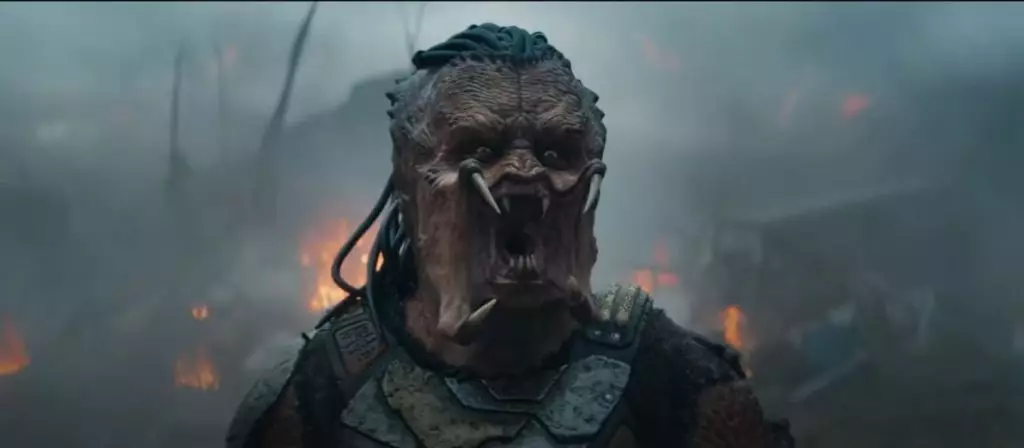The recent showcase of upcoming movies like *Predator: Badlands* and *Tron: Ares* underscores a troubling trend in contemporary blockbuster filmmaking. Despite the promise of innovation, what we glimpse in previews and panels is often a superficial veneer designed to appease franchise loyalists rather than push cinematic storytelling into uncharted territory. The *Predator* franchise, long celebrated for its suspense and primal imagery, now appears to be veering into territory that feels stiflingly formulaic. The decision to center *Badlands* around a rebellious younger Predator who is an outcast seems to stretch the franchise’s originality, rather than invigorate it.
This move, about focusing on a Predator protagonist — a first for the series — might seem innovative on paper, but it risks diluting what once made the franchise compelling: the terrifying faceless hunter against human protagonists. When the narrative shifts from humans fighting for survival to Predators fighting among their kind, it raises questions about whether the franchise is trying to reinvent itself or simply rebrand with superficial twists. The movie’s emphasis on emotion and heart could be a double-edged sword. If it means sacrificing tension and ruthlessness for sentimentality, then the essence of the Predator’s myth as a relentless killer could evaporate, leaving a predictable and sanitized product.
Corporate Legacy and Artistic Stagnation
There’s also a disturbing pattern of studio-driven storytelling that prioritizes safe, market-tested formulas over genuine creative risks. The *Predator* franchise’s recent entries, including *Prey*, have been dismissed by some as catering too much to streaming audiences or avoiding theatrical risks altogether. The decision to release *Prey* directly to Hulu, despite critical acclaim, hints at a broader industry trend where commercial considerations override artistic innovation. This commodification of franchise properties strips away the possibility of filmmaking that pushes boundaries.
The filmmaking talent attached to these projects, like director Dan Trachtenberg, has shown genuine promise; *Prey* was a step in the right direction. But even with talented directors and impressive practical effects, the stories often feel constrained by the need to conform to a pre-existing brand. It’s as if the core audience’s expectations become chains that confine creativity. Will future *Predator* films truly surprise us, or will they continue to follow a predictable pattern that values familiar elements over storytelling integrity?
Unfulfilled Potential and Cultural Implications
This pattern reflects a broader cultural issue: the peril of resting on laurels instead of seeking meaningful innovation. What could these franchises represent beyond mere nostalgia? They could explore new themes—like the ethics of artificial intelligence or the ecological consequences of war—yet instead, they often default to tried-and-true action tropes. The focus on special effects and spectacle over substance demonstrates a prioritization of visual thrill over narrative depth.
Moreover, this approach perpetuates a cycle of stagnation that discourages genuinely diverse voices from contributing to mainstream cinema. When studios treat franchises as investments rather than opportunities for artistic exploration, they reinforce a cultural landscape where innovation is sidelined. As a center wing liberal, I believe that art inherently should challenge its audience—questioning societal norms, exploring complex characters, and reflecting evolving values. Instead, what we see are films pandering to conservative assumptions about what audiences want, reinforcing predictable narratives that do little to advance cultural conversations.
The Need for Honest Risk-Taking in Hollywood
What this all underscores is a dire need for Hollywood to embrace risk rather than retreat into familiar comfort zones. The franchise model has immense potential for creative evolution, but only if filmmakers and studios allow space for growth rather than mere replication. The *Predator* universe, with its potential for metaphor and social commentary, risks becoming a hollow playground for action and nostalgia if it refuses to adapt.
In the end, the future of franchise filmmaking should be about more than just churning out sequels and spin-offs. It needs to reflect society’s complexities and foster bold storytelling that challenges audiences—something that, for now, seems increasingly absent. If the industry continues to prioritize safe bets over innovative voices, the cultural impact might be limited to nostalgia without true substance, leaving audiences craving more than just well-executed spectacle.

Leave a Reply